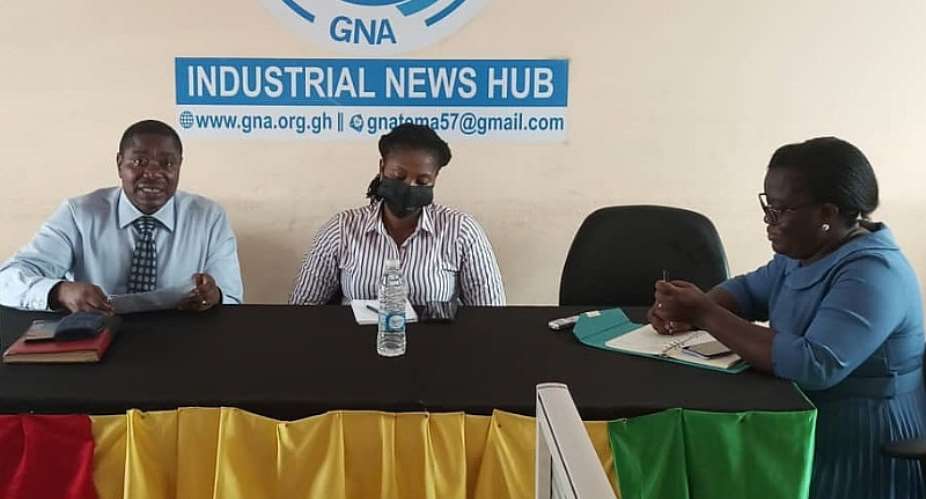A child forms integral part of the family whose welfare could not be separated from that of the family, Mr. John Ato Breboh, Senior Principal Investigator Commission on Human Rights and Administrative Justice (CHRAJ) Tema Regional Office has revealed.
“The welfare of children must, therefore, be aligned with all activities, services and norms to support the child in the context of the large family,” Mr. Breboh stated during the 14th Edition of the Stakeholders Engagement And Worker's Appreciation Day Seminar of the Tema Regional Office of the Ghana News Agency, which was monitored by the Communication for Development and Advocacy Consult (CDA Consult) in Tema.
The GNA Tema Stakeholder Engagement is a platform rolled out for state and non-state actors to address national issues and serves as a motivational mechanism to recognize the editorial contribution of reporters toward national development in general and the growth and promotion of the Tema GNA as the industrial news hub.
Mr Breboh said: "Let us love and protect our children, they are our assets, we shall account one day of how we cared for the gift given to us by God,” and called for serious introspection and commitment among parents and the public toward addressing the numerous challenges facing children in the country.
Speaking on the rights of children, Mr Breboh explained that international human rights law lays down obligations which States are bound to respect, and Ghana by becoming parties to international treaties, assumes obligations and duties under international law to respect, to protect and to fulfil human rights.
He said the obligation to respect means that States must refrain from interfering with or curtailing the enjoyment of human rights. The obligation to protect requires States to protect individuals and groups against human rights abuses.
The obligation to fulfil means that States must take positive action to facilitate the enjoyment of basic human rights.
He said through ratification of international human rights treaties, Governments undertake to put into place domestic measures and legislation compatible with their treaty obligations and duties.
“Where domestic legal proceedings fail to address human rights abuses, mechanisms and procedures for individual complaints or communications are available at the regional and international levels to help ensure that international human rights standards are indeed respected, implemented, and enforced at the local level,” he said.
Mr. Breboh said it was, therefore, vital to acknowledge children's rights and take a keen interest in children's issues by ensuring that their rights were protected.
He noted that the child protection policy which included the child and family welfare policy in Ghana considered all the laws that protect children and serves as a guide for protecting children within the family setting.
“A child who doesn’t have a network of the family goes through a lot in an event where the biological parents are not capable of taking care of them,” he stated.
He said children were vulnerable and required special protection, saying children have human rights as part of International Laws irrespective of race, gender, language, and colour among others.
The CHRAJ Chief Principal Investigator added that the dignity and integrity of children needed to be protected from injustice.
“Human rights of children just like all other human beings must not be regarded as a favour, right or privilege conferred to by the state or any organization,” Mr. Breboh stated.
Mrs Elorm Kupomey, CHRAJ Investigator contributing to the discussion said Children and young people have the same general human rights as adults and also specific rights that recognize their special needs.
“Children are neither the property of their parents nor are they helpless objects of charity. They are human beings and are the subject of their own rights,” Mrs Kupomey stated.
She said the United Nations Convention on the Rights of the Child sets out the rights that must be realized for children to develop to their full potential.
Mrs Kupomey said the Convention offers a vision of the child as an individual and as a member of a family and community, with rights and responsibilities appropriate to his or her age and stage of development. By recognizing children's rights in this way, the Convention firmly sets the focus on the whole child.
She said the Convention recognizes the fundamental human dignity of all children and the urgency of ensuring their well-being and development. It makes clear the idea that a basic quality of life should be the right of all children, rather than a privilege enjoyed by a few.






 SSNIT must be managed without gov’t interference – Austin Gamey
SSNIT must be managed without gov’t interference – Austin Gamey
 Ejisu by-election could go either way between NPP and independent candidate — Gl...
Ejisu by-election could go either way between NPP and independent candidate — Gl...
 We never asked ministers, DCEs to bring NPP apparatchiks for returning officer r...
We never asked ministers, DCEs to bring NPP apparatchiks for returning officer r...
 No one denigrated the commission when you appointed NDC sympathizers during your...
No one denigrated the commission when you appointed NDC sympathizers during your...
 Used cloth dealers protests over delayed Kumasi Central Market project
Used cloth dealers protests over delayed Kumasi Central Market project
 A/R: Kwadaso onion market traders refuse to relocate to new site
A/R: Kwadaso onion market traders refuse to relocate to new site
 Dumsor: Corn mill operators at Kaneshie market face financial crisis
Dumsor: Corn mill operators at Kaneshie market face financial crisis
 Jamestown fishermen seek support over destruction of canoes by Tuesday's heavy d...
Jamestown fishermen seek support over destruction of canoes by Tuesday's heavy d...
 Election 2024: EC to commence voter registration exercise on May 7
Election 2024: EC to commence voter registration exercise on May 7
 Public schools rebranding: We’re switching to blue and white, we’re painting all...
Public schools rebranding: We’re switching to blue and white, we’re painting all...
